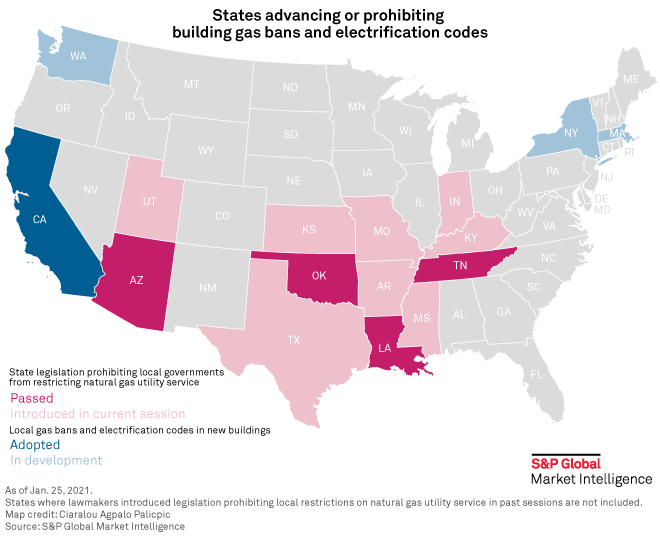S&P Global Offerings
Featured Topics
Featured Products
Events
S&P Global Offerings
Featured Topics
Featured Products
Events
S&P Global Offerings
Featured Topics
Featured Products
Events
Banking & Capital Markets
Economy & Finance
Energy Transition & Sustainability
Technology & Innovation
Podcasts & Newsletters
Banking & Capital Markets
Economy & Finance
Energy Transition & Sustainability
Technology & Innovation
Podcasts & Newsletters
S&P Global Offerings
Featured Topics
Featured Products
Events
1 Feb, 2021
Denver will take steps to ensure new homes and buildings are all-electric in the coming years, marking the Mile High City's planned transition away from natural gas heating.
City and county climate officials announced the policy in a blueprint for achieving net-zero energy status in Denver's new building stock, relased on Jan. 26. In the plan, Denver's Office of Climate Action, Sustainability and Resiliency, or CASR, committed to updating the building code in a way that will drive electrification in new homes and commercial real estate over the next decade.
The plan makes Denver the latest U.S. city to pursue universal all-electric construction. Dozens of California communities have adopted electrification ordinances since 2019, and efforts are underway to restrict new natural gas hookups in Massachusetts, Seattle and New York City.

Unlike other areas, Denver is not yet pledging to explicitly prohibit natural gas hookups. CASR's implementation plan instead establishes a framework for updating the building code in 2021, 2024 and 2027, with a goal of slashing greenhouse gas emissions from Denver's building stock through 2030.
However, electrification requirements are under consideration and could be necessary. Denver is unlikely to see meaningful building electrification without regulation that "explicitly or effectively requires it," according to some stakeholders whose insight informed the report, the Net Zero Energy New Buildings and Homes Implementation Plan.
Tackling Denver's building emissions
CASR developed the report in order to align Denver's 2018 Climate Action Plan with more recent recommendations from its Climate Action Task Force. The task force said Denver should accelerate its net-zero goal by making sure buildings are highly energy efficient, are powered by electricity, produce or draw power from renewable sources and contribute to grid flexibility.
The plan seeks to get ahead of construction and electric grid trends in order to cut emissions from buildings, which accounted for 64% of the city's 2019 greenhouse gas emissions. The city forecasts that 40% of its total building stock in 2050 will have been built over the previous 30 years. Meanwhile, Denver electricity provider Xcel Energy Inc. has committed to cutting emissions from power generation by 80% by 2030 and 100% by 2050.
Xcel Energy, which also distributes gas in Denver, is reviewing the plan and looks forward to continuing to work with stakeholders, Xcel media relations representative Michelle Aguayo said. The company is particularly focused on potential equity impacts on its most vulnerable customers, she added.
"We're committed to supporting our cities and helping them achieve their clean energy goals," she said. "Customer's preference is also top of mind for us. New all-electric buildings and homes have a part in a low carbon future, and we currently offer a program that supports this type of development."
Mike Henchen, a building electrification principal at Rocky Mountain Institute, said the plan establishes Denver as a building decarbonization leader. "With this shift to efficient, all-electric new homes and buildings, Denver residents and businesses will save money by avoiding gas infrastructure, reduce the local pollution that afflicts Colorado's Front Range and drive real reductions in the use of fossil fuels that cause climate change," he said.
Challenges ahead, solutions in phases
In the short term, Denver policymakers will have to overcome considerable challenges.
There is effectively no electric building market in Denver, consumer awareness is low and the city would have to shore up code enforcement staff, according to the report. Additionally, most of the savings in all-electric buildings come from avoiding the cost of installing gas infrastructure during construction. Electric appliances and systems are typically more expensive than gas appliances, the report found.
The report also raised performance and operating cost concerns. While electric heat pumps are highly efficient, Colorado's cold climate reduces the efficiency advantage over gas furnaces. Meanwhile, the state's gas prices are very low. The risk of all-electric buildings carrying higher operating costs is a particular concern in households, where space and water heating loads are high, stakeholders warned.
The plan calls for tackling electrification in phases. The city will develop a requirement that new buildings be able to accommodate all-electric systems in the 2021 code update. The schedule also calls for exploring electrification requirements for new townhouses, low-rise apartments and some commercial building systems.
In the 2024 code, officials expect to tackle all-electric construction of single-family homes and mid-rise apartment complexes, as well as space heating in new hotels, warehouses and office and retail buildings. Finally, the plan targets all-electric construction in high-rise apartments and commercial water heating systems in the 2027 code.
City officials do not expect to adopt a natural gas infrastructure ban pioneered in Berkeley, Calif. However, Denver Energy Program administrator Amber Wood said the city makes a distinction between Berkeley's ban and policies requiring all-electric construction. The report also says another California policy could be viable. That requires buildings with natural gas hookups to achieve higher energy performance standards than all-electric buildings, which increases the cost of including gas systems.
CASR collaborated on the plan with Denver Community Planning and Development, which manages the code update program. The departments will work together to implement the plan. CASR will develop code amendments that would go through an adoption process before being reviewed by the city council for inclusion in the city code. The city is developing strategies for electrifying existing buildings in a separate report, due out by the end of 2021.
